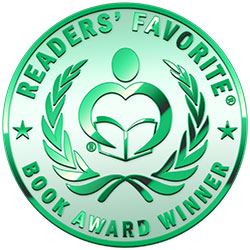
 This author participates in the Readers' Favorite Free Book Program, which is open to all readers and is completely free. The author will provide you with a free copy of their book in exchange for an honest review. You and the author will discuss what sites you will post your review to and what kind of copy of the book you would like to receive (eBook, PDF, Word, paperback, etc.). To begin, click the purple email icon to send this author a private email.
This author participates in the Readers' Favorite Free Book Program, which is open to all readers and is completely free. The author will provide you with a free copy of their book in exchange for an honest review. You and the author will discuss what sites you will post your review to and what kind of copy of the book you would like to receive (eBook, PDF, Word, paperback, etc.). To begin, click the purple email icon to send this author a private email.
![]() This author participates in the Readers' Favorite Book Review Exchange Program, which is open to all authors and is completely free. Simply put, you agree to provide an honest review an author's book in exchange for the author doing the same for you. What sites your reviews are posted on (B&N, Amazon, etc.) and whether you send digital (eBook, PDF, Word, etc.) or hard copies of your books to each other for review is up to you. To begin, click the purple email icon to send this author a private email, and be sure to describe your book or include a link to your Readers' Favorite review page or Amazon page.
This author participates in the Readers' Favorite Book Review Exchange Program, which is open to all authors and is completely free. Simply put, you agree to provide an honest review an author's book in exchange for the author doing the same for you. What sites your reviews are posted on (B&N, Amazon, etc.) and whether you send digital (eBook, PDF, Word, etc.) or hard copies of your books to each other for review is up to you. To begin, click the purple email icon to send this author a private email, and be sure to describe your book or include a link to your Readers' Favorite review page or Amazon page.
![]() This author participates in the Readers' Favorite Book Donation Program, which was created to help nonprofit and charitable organizations (schools, libraries, convalescent homes, soldier donation programs, etc.) by providing them with free books and to help authors garner more exposure for their work. This author is willing to donate free copies of their book in exchange for reviews (if circumstances allow) and the knowledge that their book is being read and enjoyed. To begin, click the purple email icon to send this author a private email. Be sure to tell the author who you are, what organization you are with, how many books you need, how they will be used, and the number of reviews, if any, you would be able to provide.
This author participates in the Readers' Favorite Book Donation Program, which was created to help nonprofit and charitable organizations (schools, libraries, convalescent homes, soldier donation programs, etc.) by providing them with free books and to help authors garner more exposure for their work. This author is willing to donate free copies of their book in exchange for reviews (if circumstances allow) and the knowledge that their book is being read and enjoyed. To begin, click the purple email icon to send this author a private email. Be sure to tell the author who you are, what organization you are with, how many books you need, how they will be used, and the number of reviews, if any, you would be able to provide.

Reviewed by Lit Amri for Readers' Favorite
In Loving Andrew, Romy Wyllie tells the story of her Down syndrome son, Andrew James Wyllie, and also stories about Lindsay Yeager and Blair Rodriguez; both with the same condition. It is not only about how Romy and her family face the challenges of raising a Down syndrome child, but the joy and life lessons that he bestowed upon them.
I never knew that a person with Down syndrome could be affected by mental illness, such as paranoid schizophrenia in Andrew’s case. This revelation is quite a surprise for me due to my lack of knowledge in this matter. Reading about the public and the medical community’s reception in the late fifties towards Down syndrome is informative; I’m glad that society is more knowledgeable about Down syndrome although the lack of understanding regarding the disabled people still lingers today.
My mother is a retired nurse for almost 15 years now, and I clearly remembered what she said about Down syndrome children, “It is sad that their life span is shorter than us.” I’m glad to know that Andrew lived until he was fifty-two, although it was hard to read about his decline from a high-functioning man with Down syndrome, to a man who had to battle paranoid schizophrenia and Alzheimer's in his last years.
I truly appreciate that Romy Wyllie shares her story about Andrew with the rest of the world. Loving Andrew is an eloquently written book and definitely a helpful guide as well as inspiration for everyone, especially parents with disabled children.